Music activities have a way of appealing to kids like no other art form. Toddlers love listening to their favorite tune as it brightens their day and also provides significant brain development. But even older kids like 4th grade students can learn music theory and concepts through games!
That doesn’t come as a surprise as a study done in 2016 points out that exposing your child to music leads to accelerated brain development (especially when it comes to reading skills and picking up language).
Furthermore, exposing your child to music early in their lives is vital in helping them develop creative mindsets. Keeping these benefits in mind, we’ve compiled a list of 35 fun music games for 1st grade through 4th grade to help your kids get started on their learning adventures!
Read on to discover several fun music-centered games that are not only going to help your child’s development but also provide them with a fun time!
How is Music Important to Young Children’s Development?
If you ask most kids what their favorite class is in school, they’ll often reply with ‘music classes’. There’s a good reason for that too – music activities taught by music teachers not only provide them with vital skills but also extend to being incredibly fun activities that are often carried out in groups.
By helping your children learn to catch a steady beat, these music classes are preparing them for the future in ways you couldn’t even imagine! Let’s look at some of the ways music activities bolster your child’s development:
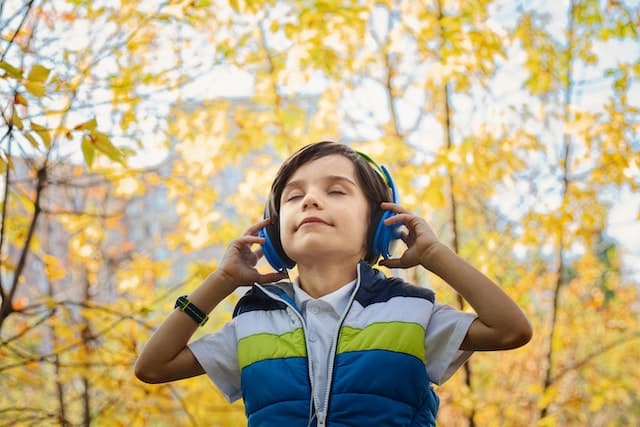
How Listening to Good Music Impacts Brain Development
Have you ever wondered how your favorite songs (folk songs, rock music, or even pop music) can impact your brain development?
The research points towards music providing the ability for our brains to improve concentration, memory, thinking skills, spatial intelligence, as well as other cognitive capabilities.
To date, studies are being done to figure out how our brains hear and reach to music. The basic explanation points towards music sending out rhythm patterns of vibrations that travel through the air and reach our ear canals.
These sound vibrations proceed to ‘tickle’ the eardrums and transform into electrical signals that travel through the auditory nerves to the brain, where they finally assemble into what we perceive as music.
Several researchers asked rappers and jazz performers to lie down inside an fMRI (functional magnetic resonance imaging) and then watched which areas of their brains lit up when listening to/improvising music.
This research showed that music isn’t just random – it’s structural, architectural, and mathematical. One note has a relationship with the next and to make sense of all of this, our brain does a lot of hard work!
Keeping this in mind, it’s vital to include a general music curriculum in schools today as it helps children’s brains develop in ways no other activity can.
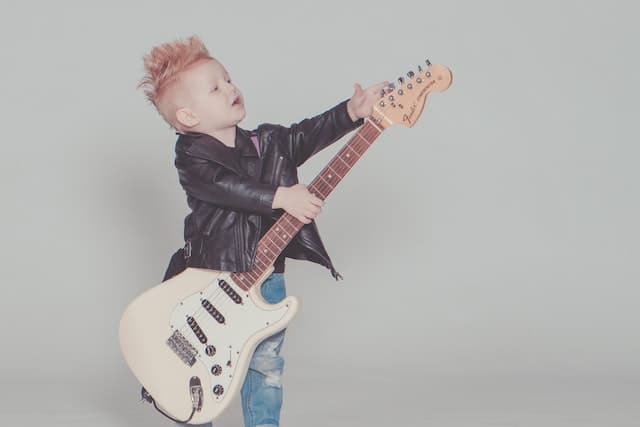
Effects of Learning to Play a Musical Instrument
Listening to music is one thing but playing musical instruments is a whole other ball game! Different instruments require different sets of skills for example, playing a flute requires practicing inhalation and exhalation, whereas playing a guitar requires having a certain level of finger strength.
However, learning any instrument requires a good knowledge of musical notations and learning about half notes, quarter notes, eighth notes, and even the treble clef.
Some of the major effects of learning to play a musical instrument include:
- An increase in cognitive ability. In short, your child is going to become a lot smarter and it’s also going to help them with their memory!
- A decrease in stress levels. While children have fewer things to stress about compared to adults, they do have certain battles to face. Playing music allows them to feel calm and allows them to be happier in life. Studies have shown that ‘happy hormones’ are released through the bloodstream when we listen to or play music.
- Music will help your child make new friends. Engaging socially can be a challenge when growing up but attending music lessons with other kids often solves this as your child is around other kids who share an interest in music.
- Playing musical instruments bolsters creative skills. Enrolling your child in music classes will allow them to express themselves in a new way. This skill can be taken over to other areas of their lives, such as writing or cooking.
- Furthermore, playing musical instruments helps your child develop confidence. After all, this is a skill that they know nothing about and as time progresses, they get better at it. This confidence helps them in various areas of their lives.
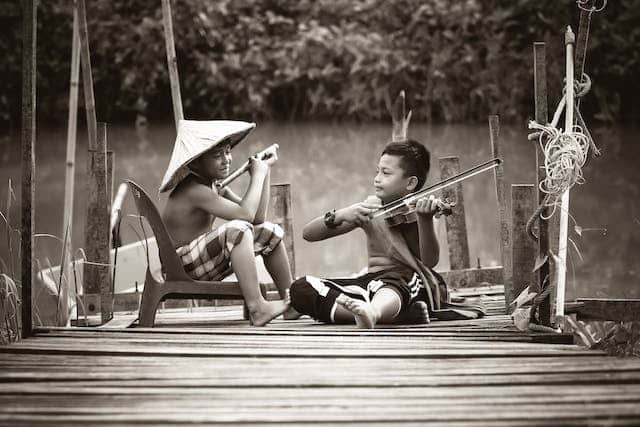
Learning to Work as a Group Through Musical Instruction
Music has the wonderful ability to help your child learn to work as a group through musical instruction. Music programs and musical skills promote the idea of teamwork and can be a vital tool in lesson plans in classroom environments.
Fun music classroom games promote teamwork and build motivation for kids of all ages. They allow children to learn specific skills and instrumental abilities to achieve musical goals in the future.
One of the ways elementary music classrooms can promote vital life skills in children is to help them learn to cooperate with those around them. Furthermore, it also teaches children the importance of following instructions and listening.
Apart from that, learning to work as a group through music builds motivation as it allows children to see that others around them are going through the same tough process.
Learning to play musical instruments isn’t easy however watching others do it offers a sense of motivation and lays birth to the idea of ‘We’re all in this together’.
Furthermore, musical learning reduces performance anxiety as well as learning anxiety. It allows children to ‘get in the moment’ and not feel the pressure of having to perform better.
The idea is to enjoy the process and get deep into it rather than focus on not making mistakes.
Finally, learning to work as a group through music allows versatility. It exposes children to different kinds and genres of music and to a variety of skills that they can adapt to perform better.

Musical Games for Elementary-Aged Children
Time to get to the good stuff! Musical games are some of the most fun activities for children and fun music games give the perfect opportunity to teach your children vital skills.
Below, we’ve compiled a list of the best music games for 1st grade through 4th grade that can help children of all ages (especially fourth graders) develop skills that can remain beneficial throughout their lives:
Listening
The first category of musical games for elementary-aged children is listening games. Listening is one of the most important skills that can be taught to children. Although it is often overlooked, it is easy to develop with simple games and activities.
- Musical Chairs
Every child loves playing musical chairs. Not only is it fun but it also allows children to flex their problem-solving and listening skills.
It’s a popular birthday party game and can be played with simple songs and some chairs, or even bean bags.
- Music Maps
Another advanced listening game for kids is Music Maps. It’s an elimination game in which your child has to focus on what they’re hearing and map out the progression of the music.
- Freeze Dance
Freeze Dance has simple rules that make it one of the best games for young children. It helps improve cognition, and social skills, as well as focusing on motor skills.
The idea is to dance while the music plays and once it stops, you’re supposed to freeze.
- Songli
This is a game that can be played both alone and with friends. It has over 50 pre-made quizzes and each player has to choose a song and ask others to guess it.
Once you know the song, type in the song name. The faster the guess, the more points you will accumulate!
- Pass the Parcel
Another popular game in schools is pass the parcel, and all you need for it is lollies/toys that you can wrap in wrapping paper. While the music plays, children are supposed to pass the parcel.
When the music stops, the child with the parcel gets to enjoy its contents!
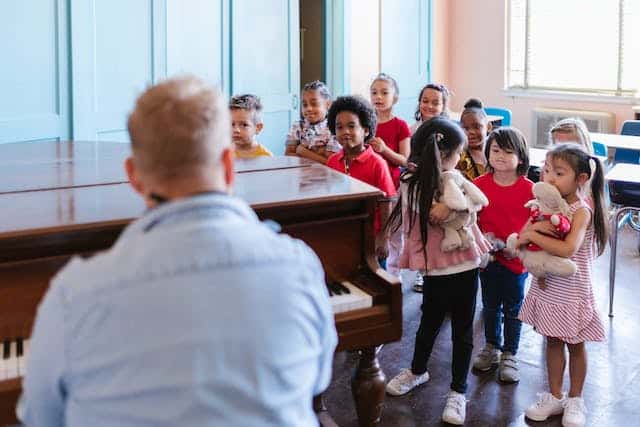
- Musical hot potato
For this fun activity, you require a whiteboard and you start by writing 5 questions on it. These questions are based on helping children learn more about each other.
While the music plays, the children pass an object and when the music stops, the child with the object has to answer the questions.
- Melody Pass Elimination Game
This is an elimination game in which players learn 2-7 melodic prompts. Each prompt gives the turn to a different player and if they don’t respond in time, they are eliminated.
It’s a wonderful activity to improve listening skills and improve music literacy.
- Name that tune
For 4th graders, ‘Name that tune’ is a great way to develop an understanding of music.
The class can be split into teams and children are required to guess the song title and artist name.
- Echo Parachute Game
The echo parachute game is a parachute activity that asks children to think about the structure of phrases and their rhythm.
Adults think of a simple phrase and say/sing it while shaking their parachutes. After this, the child has to copy it in the same way the adult did.
- Describe what you hear
‘Describe What You Hear’ is a brilliant music game that gets children to focus on composition and use creative language tools to describe it.
This is for kids of all ages and helps them develop basic musical concepts (melody, rhythm, and timbre).
- What’s that sound?
Children love learning about musical instruments and ‘What’s that sound?’ is the music game that helps them learn best.
The game starts by playing short clips of musical instruments, and children have to guess which instrument is making that sound.
Movement
- Pop Song Charades
If you’re a charades lover, pop song charades is here to make your day! This is a game that incorporates charades with music and requires two groups.
Children are required to act out the songs and the other children are supposed to guess it.
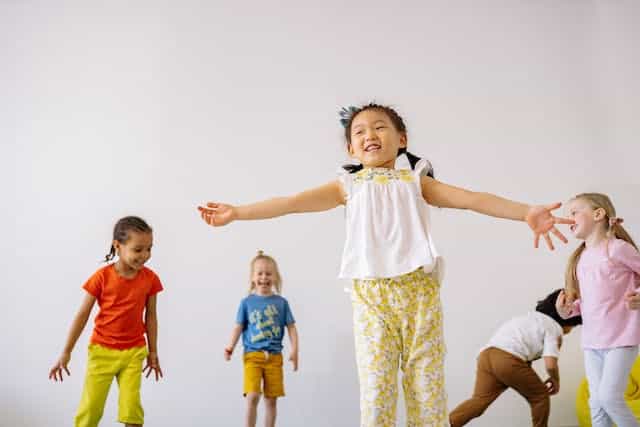
- Animal Dance
In Animal Dance, children pick cards at random and dance to the music the way that specific animal would.
It’s a wonderful game full of creativity and imagination that makes children think from the perspective of animals while learning about them.
- Hokey Pokey
Hokey-Pokey is one of the most famous games that requires learning the song and its dance moves.
This musical activity encourages children to learn about their body parts, as well as distinguishing between left and right.
- Feather Dancing
For Feather Dancing, all you need are a few large fake feathers that allow you to dance to your favorite music.
Children can be directed to move quicker to faster pieces of music and slower to the somber ones.
- Mama Llama
Mama Llama is a one-of-a-kind game that involves singing and tapping the legs/hands of those on either side of you.
Children’s names are called out to allow them to perform solo movements, and other children are supposed to mimic these movements.
Rhythm & Coordination
Balance and coordination are two of the most important gross motor skills in a child’s developmental phase.
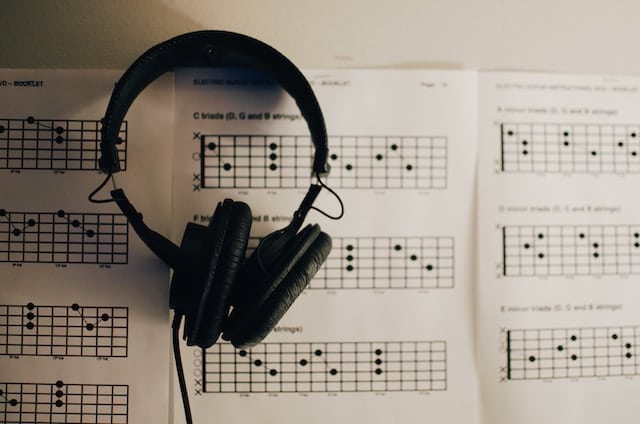
Some of the best fun music games to help develop these skills are:
- Poison rhythm
Poison rhythm is a favorite of many and it involves the teacher/adult clapping 4-beat simple rhythms that the children have to follow.
When the teacher/adult is clapping, all the children have to listen and once it’s their turn, they have to repeat it.
- The Cup Game
The Cup Game is a signature game that involves songs with quadruple meter or 4-bar phrases.
For this game, you require one plastic cup per child and music. To begin, you have to place one plastic cup upside down and clap and tap the cup.
- Random rhythms
Random Rhythms is a game designed to teach clapping and writing rhythms. Children are given a six-sided dice that is assigned a rhythmic value.
After this, the students roll their dice and place their random rhythm onto a blank page. Once 16 bars are complete, this rhythm has to be clapped.
- I have, who has
In this game, each student is given a card with 2 rhythms on it. One of these is used to identify whereas the other is for repeating.
When a child hears the rhythm that they have on the “I have” part of their card, they have to raise their hands.
- Rhythm cakewalk
Rhythm cake walk is a game in which children lie on the floor with paper. The rhythm is played on a hand drum and the students have to walk to this rhythm.
There are two ways they can get out of this rhythmic cycle. If they aren’t walking to the rhythm properly and if they don’t land on a piece of paper.
- Play homemade drums
This musical game allows children to create music by using drum beats.
Items like tin cans, boxes, and more, can be used to create homemade drums.
- Boom, Snap, Clap
Boom, Snap, Clap is a fun partner activity in which children can sing familiar songs and the other half of the group has to support them with boom, snap, and clap sequences.
Roles can be switched mid-way to give the other children a chance to do the same.
- Whizz!
Not all sound effects games are as fun as Whizz! To play, children have to pass the sound ‘Whizz’ to the person on their right.
At any time, a child can pass the sound and gesture in the other direction. The idea is to maintain a steady beat and other sounds (like “Zoom” or “Boing”) can be added.
Music Theory
Teaching music concepts such as music theory can sound challenging. However, with the help of these fun music games, the impossible is made entirely possible!
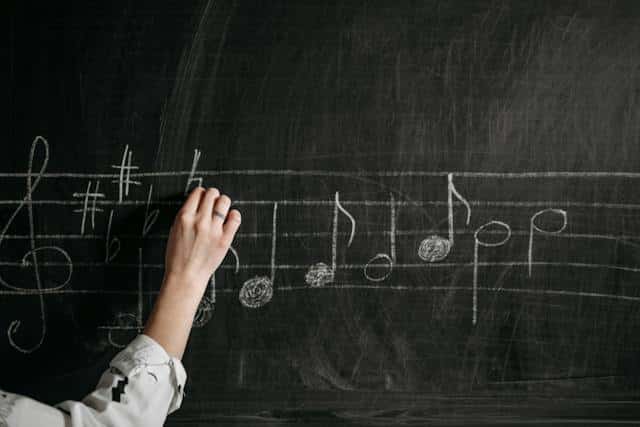
- Find your instrument twin
Find Your Instrument Twin is a music game meant for elementary classrooms. Each child is provided with flashcards with an instrument.
The same instrument name is written on two more cards and students have to walk around making the sound of their instrument in this game.
- Hear, Clap, Write
Hear, Clap, Write is a game that provides musical notes to teach children the basics of rhythm writing.
In this game, children learn whole notes, half notes, eight notes, and even quarter notes. To play, you need to give each child dry-erase markers and a plastic-covered piece of cardboard with 16 squares.
- Little Maestros
Little Maestros is the perfect game to introduce young Maestros to reading or writing sheet music.
For this, you need paper and pens and you can start by providing some symbols for different sounds to children.
- Name That Note: Online Music FlashCards
Reading notes becomes easy with ‘Name That Note: Online Music Flash Cards’. In this game, children are taught how to read music from 4 different clefs.
The idea is to name as many music notes as you can within a certain time.
- Compose a rap
A favorite of many children is ‘Compose a Rap’ as it allows children the chance to creatively express themselves through rapping.
This game can be started by teaching children some examples of AABB rhyming schemes that are used in raps.
- Create musical words
Another amazing music game is ‘Create Musical Words’ as it allows children the opportunity to create. Students can be in groups and they’re supposed to come up with as many musical words as they can.
- Create a commercial
‘Create a commercial’ asks children to focus on the composition of music. Divide the children into groups and give them access to musical instruments.
Provide them with a product and ask them to write a jingle on it. It’s a wonderful game to boost a child’s creativity!
- Music Trivia
To play Music Trivia, the children have to be split into teams of 3-4 students. Each team picks a music-related name and gets a triangle or bell.
The class has to ask several music-related questions (can be related to musical terms) and the groups have to answer them as best as they can.
Singing
Singing games aren’t only fun, they’re also wonderful at teaching children vital memory retention skills that can help them in the future. Let’s take a look at some of these games:
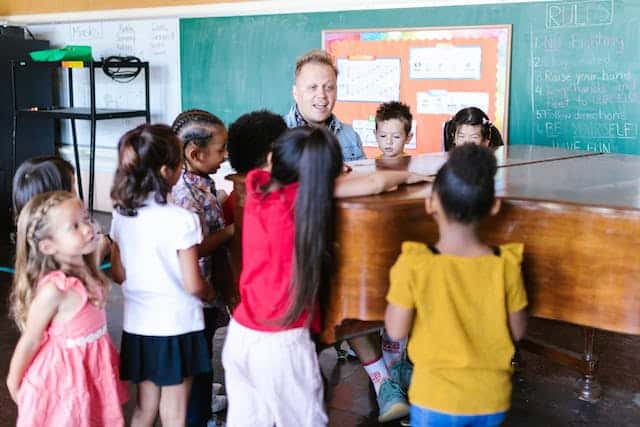
- We’re Floating Down the River
One of the most fun singing games is ‘We’re floating down the river’ and this game comes in 2 sections.
One of these is in the compound meter while the other is in duple. Students have to make a circle with one person in the center. While that individual sings, the others have to make beats to assist them.
- Alley Alley-O
‘Alley Alley-O’ is a British singing game in which children form a line and hold hands before they begin to play.
Children weave under each other’s arms until everyone’s arms are crossed. While singing, the motions are reversed until everyone is standing with uncrossed arms.
- Down by the Bay
‘Down By The Bay’ is a response song game. In this game, children are able to freely express themselves and come up with original lyrics as they play.
Tons of benefits can be availed from this game for children of all ages. Plus, children can practice the ‘call and echo’ form. Of course, let’s not forget that this game is incredibly fun!
Our team loves helping parents and teachers find great ways to engage the next generation so they can have fun while learning. Check out these articles for more awesome ideas:
- 20 Best Online 2nd Grade Spelling Games (Free)
- 25 Best Financial Literacy Games for College and High School Students
- The Best Free Online Color Games For Preschoolers

Farah Jassawalla is a technology enthusiast with a keen interest in AI, ML, and anything digital. Her passion for technology extends into her work as she currently manages the blog and social media for one of Canada’s most awarded tech and IT companies, in addition to consulting and writing for other brands. She’s an avid reader, writer, and researcher who is always looking out for the next big update in the digital world.

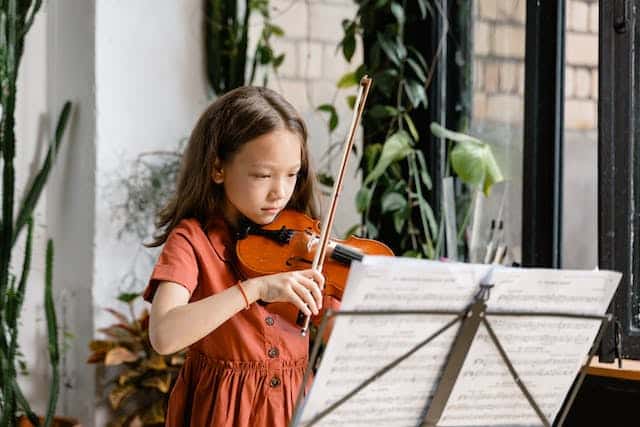






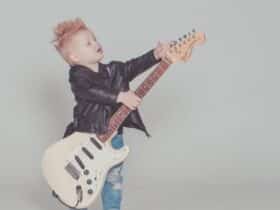

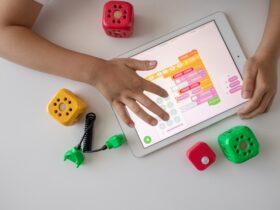



Leave a Reply